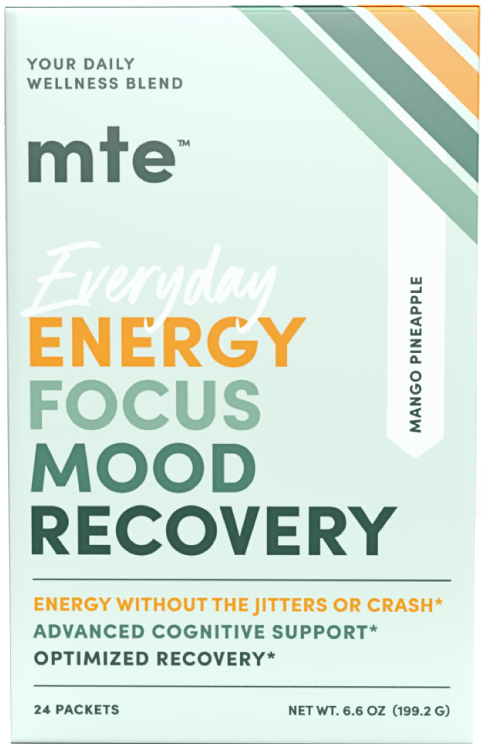
Caffeine-Free Energy: 7 Ways to Stay Awake Without Coffee
Mornings can be rough. You drag yourself out of bed, groggily reach for that first cup of coffee, and hope it’ll magically turn you into a fully functioning human being.
The struggle to wake up and feel energized without that caffeine kick is all too real. The problem is that relying on caffeine can create a vicious cycle of energy spikes and crashes that leaves you more exhausted.
But here’s the good news: there are simple, natural ways to wake up and maintain that energy all day without relying on caffeine.
In this article, we’ll explore seven effective ways to start your day with caffeine-free energy that keeps you going strong without the jitters or afternoon crashes. Embrace these strategies to stay awake without caffeine and say hello to brighter, more energized mornings.
7 Ways to Get Caffeine-Free Energy: How to Stay Awake Without Caffeine
Feeling energized without coffee may sound like a dream, but it’s possible with a few simple tweaks to your routine. We’re talking about small changes that pack a big punch – things you can easily incorporate into your mornings to set yourself up for a day of calm, jitter-free energy.
Whether you’re looking to stay awake without caffeine or just want to explore healthier ways to fuel your day, these strategies will help you harness caffeine-free energy that lasts.
1. Start Your Day With a Healthy Meal
While it might be tempting to grab something quick and sugary, what you eat in the morning affects your energy levels throughout the day.
According to a study published in PLOS ONE, eating a low-fat meal can significantly impact your energy levels later in the morning. As a result, you may feel great after breakfast, but as time passes, fatigue sets in, leaving you less equipped to tackle the day ahead.
If you want to feel energized without relying on the caffeine crutch, focus on eating a mix of protein, healthy fats, and complex carbs to keep your energy stable and your body nourished. Our top picks include:
- Eggs: Packed with protein and essential nutrients, they provide a steady energy release that keeps you full and focused.
- Greek yogurt: Rich in protein and probiotics, Greek yogurt supports gut health while delivering a creamy start to your day.
- Avocados: Full of healthy fats and fiber, avocados help you feel satisfied and provide a slow-burning energy source.
- Nuts: Almonds, walnuts, and other nuts offer healthy fats and protein, which is an excellent addition to your breakfast or a quick snack.
- Spinach: This leafy green is loaded with iron and other micronutrients that support oxygen transport and energy production in the body.
- Apples and bananas: These fruits provide natural sugars and fiber to keep your energy levels stable without a crash.
Having a lighter, well-balanced meal in the morning can prevent that sluggish feeling often associated with heavy breakfasts. A lighter meal is easier to digest, allowing your body to convert it into energy more efficiently.
To keep your energy levels steady and avoid reaching for caffeine, it’s also a good idea to have a few healthy snacks on hand. A handful of nuts or a piece of fruit can help you maintain energy levels throughout the morning without making you drowsy.
2. Go Out for a Walk
You might think of walking as just another way to get from point A to point B, but it’s one of the simplest ways to boost your energy levels (no caffeine required).
A study published in BMC Geriatrics found that older adults, who often feel the fatigue battle the hardest, reported higher energy levels when they made walking a part of their routine.
Just think about that for a second. If a quick stroll can make a noticeable difference for them, imagine what it can do for you.
Walking gets your blood moving and your heart pumping, which helps deliver more oxygen and nutrients to your muscles and brain. This increased circulation wakes your body and mind, giving you that much-needed caffeine-free energy boost to power through your morning.
When you step outside and get a bit of sunlight, it helps sync your body’s internal clock (that’s your circadian rhythm for all the science buffs out there). As a result, it’s easier to feel awake and alert during the day.
In addition, sunlight helps our body produce vitamin D, which is crucial for keeping those energy levels up (more on that later).
So, next time you’re dragging in the morning or feeling that mid-afternoon slump creeping in, lace up your shoes and head out for a walk.
3. Even Better, Exercise
Spending energy to gain energy might seem counterintuitive, but that’s exactly how it works.
A systematic review and meta-analysis published in the Health Psychology Review found that regular physical activity significantly improves feelings of energy and reduces fatigue.
The research compiled data from multiple studies and concluded that exercise has a consistently positive effect on energy levels, regardless of the type or intensity of the activity. In other words, whether you’re doing a quick yoga session, lifting weights, or going for a run, you’re setting yourself up for a more energized day.
Why does this happen?
Like walking, exercise gets your heart and lungs working harder, which helps deliver more oxygen and nutrients to your brain and muscles. In addition, exercise causes your body to release endorphins – those feel-good chemicals that boost your mood and make you feel more alert.
So, how can you incorporate exercise into your morning routine without it feeling like a chore? Here are a few tips:
- Start small: If you’re not used to morning exercise, start with 10-15 minutes of activity. Whether it’s stretching, yoga, or a quick bodyweight workout, this small commitment can make a big difference.
- Mix it up: Keep things interesting by varying your workouts. Try a combination of cardio, strength training, and flexibility exercises throughout the week to keep your routine fresh and engaging.
- Prep the night before: Lay out your workout clothes and gear the night before. This simple step can reduce the morning decision-making process and make it easier to jump right into your routine.
- Make it fun: Choose activities you enjoy, like dancing, cycling, or playing with your dog. The more you enjoy the exercise, the more likely you are to stick with it.
4. Try Breathing Exercises
Breathing exercises work by increasing the oxygen flow throughout your body. This influx of oxygen helps to clear your mind, reduce stress, and elevate your energy levels. It’s like hitting the refresh button, but for your body.
Here are a few breathing techniques you can do when you feel your energy levels going down:
| Breathing Technique | Purpose | Steps | Benefits |
| 4-7-8 technique | Calm the mind and energize the body. | 1. Inhale through your nose for 4 seconds. 2. Hold your breath for 7 seconds. 3. Exhale through your mouth for 8 seconds. 4. Repeat 3-4 times. |
- Increases oxygen flow - Reduces stress - Improves focus |
| Alternate nostril breathing | Balance energy and calm the mind. | 1. Close your right nostril with your thumb; inhale through the left nostril. 2. Close your left nostril with your ring finger; release the right nostril and exhale. 3. Inhale through the right nostril; close it with your thumb; release the left nostril and exhale. 4. Repeat for 5-10 cycles. |
- Balances energy - Refreshes and centers the mind |
| Box breathing | Stay calm and focused. | 1. Inhale deeply through your nose for 4 seconds. 2. Hold your breath for 4 seconds. 3. Exhale slowly through your mouth for 4 seconds. 4. Hold your breath for 4 seconds. 5. Repeat 4-5 times. |
- Resets the nervous system - Provides a quick energy |
5. Drink More Water
When your body doesn’t get enough water, it struggles to perform basic functions, which leaves you feeling sluggish and tired. Even mild dehydration can tank your energy levels, which makes it hard to stay alert and focused.
And it all makes sense, considering how water is involved in almost every chemical process in the body.
When you’re well-hydrated, your body operates like a well-oiled machine, and guess what? That means more natural energy for you without the need for caffeine.
But let’s be honest – staying hydrated isn’t always a priority, especially when life gets busy. If you’re the type of person who often forgets to drink water, here are a few tips to keep you hydrated:
- Before you even think about breakfast, down a big glass of water.
- Set hourly reminders or use a hydration app to give yourself a nudge to drink up.
- Have a water bottle within arm’s reach at all times, whether you’re at your desk, in the car, or just lounging around.
- If plain water doesn’t do it for you, throw in a slice of lemon, lime, or cucumber.
6. Take Vitamins (D3 and B12)
A good diet is not just about protein, carbohydrates, and healthy fats – you also need key micronutrients like vitamins to keep your energy levels steady and your body functioning at its best. Two of the most important ones are vitamins D3 and B12.
Vitamin D3 supports mitochondria, the parts of your cells responsible for generating energy. They’re like tiny batteries that convert nutrients into the energy your body needs to function.
When your D3 levels are low, those batteries don’t charge as efficiently, which leaves you feeling drained. According to research, that’s how 24% of people in the US, 37% in Canada, and a staggering 40% in Europe feel because they are not getting enough vitamin D.
Now, let’s talk about vitamin B12, which helps turn food into energy by supporting your body to convert carbohydrates, proteins, and fats into glucose, which fuels your cells. B12 is also essential for the formation of red blood cells.
When B12 levels are low, red blood cells can become larger and irregularly shaped, which hinders their ability to move through your bloodstream and effectively transport oxygen to your organs and tissues.
The reduced oxygen delivery leads to fatigue and low energy levels commonly associated with B12 deficiency.
7. Try a Caffeine-Free Energy Drink Powder
Caffeine-free energy drink powders are packed with natural ingredients designed to support your body’s energy production and help you feel more awake and focused throughout the day. That’s without the jitters and crashes that come with caffeine overconsumption.
So, how do they work?
Let’s take MTE, for example.
This caffeine-free energy drink powder is packed with adaptogens, nootropics, and superfoods that work together to provide steady, sustained energy.
Adaptogens help your body manage stress and maintain balance, nootropics support cognitive function, and superfoods deliver essential nutrients that maintain health.
Combine them and get a calm, steady energy boost that helps you feel better every morning and keeps you going strong all day.
Ease into Your Day with MTE’s Smooth Energy Boost
These seven game-changing strategies help you start your day with sustained, caffeine-free energy. You can try them individually or mix and match to see what works best for you – because everyone’s energy needs are a little different.
But if you really want to kick things up a notch, add MTE to your morning routine to manage stress, improve focus and productivity, boost mood, and provide your body with the nutrients to stay awake without caffeine.
The best part is that the benefits of this caffeine-free energy booster stack over time, which means the more consistently you take it, the better you’ll feel.
So, if you want to say goodbye to that sluggish, coffee-dependent start of the day, order MTE and discover how to become more focused and productive.



